Spring of Discontent: Mexican Berry Pickers Strike for a Bigger Share of Profits
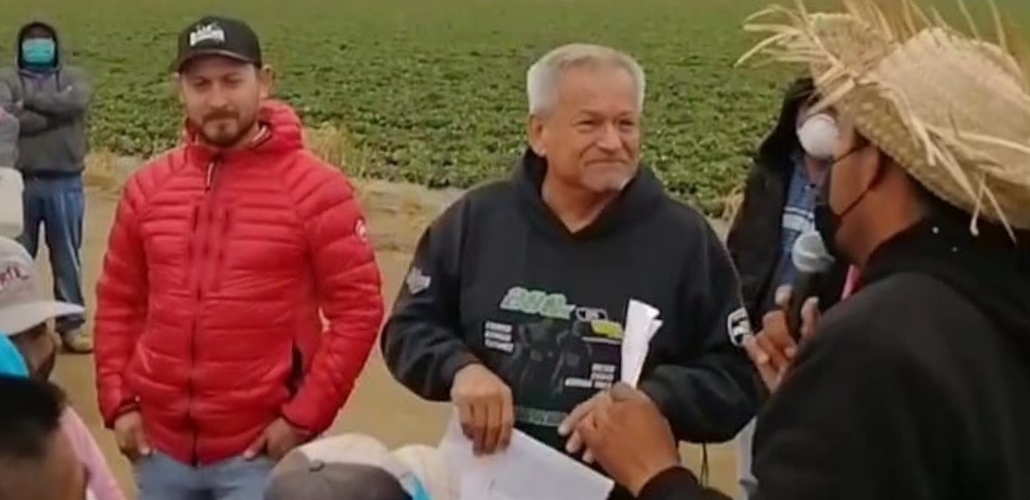
Workers and SINDJA confronted grower Felipe Ruiz Esparza Arellano.
In a major agro-export region four hours south of the U.S-Mexican border, berry pickers went on strike May 28 to demand a bigger share of the profits they produce.
Over the following week, protests and strikes erupted on farms throughout the San Quintín valley, a major source of berries, tomatoes, chilies, and cucumbers.
A second wave of strikes began June 30.
The first struck farm, Agrícola Fragaria, had refused payment of Employee Participation in Company Profits (PTU), a constitutionally based requirement—the official calculation for 2022 was that 10 percent of a company’s profits should be distributed to workers.
The farmworkers contacted the Independent National Democratic Union of Agricultural Day Laborers (SINDJA) to support the strike and negotiate on their behalf.
MEAGER PAY
Strikes soon spread to other agricultural operations in the valley. Farmworkers picking strawberries and blackberries for Rancho Nuevo Produce stopped work on May 31 and rallied outside the fields with members of SINDJA.
Rancho Nuevo exports berries for Andrew & Williamson Produce under the Good Farms label for Whole Foods and Costco, where they are sold in cartons that say “improving lives from farm to table.”
Despite the farm’s long history of meager pay and labor rights violations, the Equitable Food Initiative (EFI) certifies its products as “responsibly grown, farmworker assured.”
SINDJA General Secretary Abelina Ramírez Ruíz said the strikes erupted because workers viewed the amount of profit-sharing as a “miserable” amount. For example, a small grower called Rancho Agricola Visoje disbursed between 20 and 60 pesos ($1 to $3 U.S.) per worker, for the year.
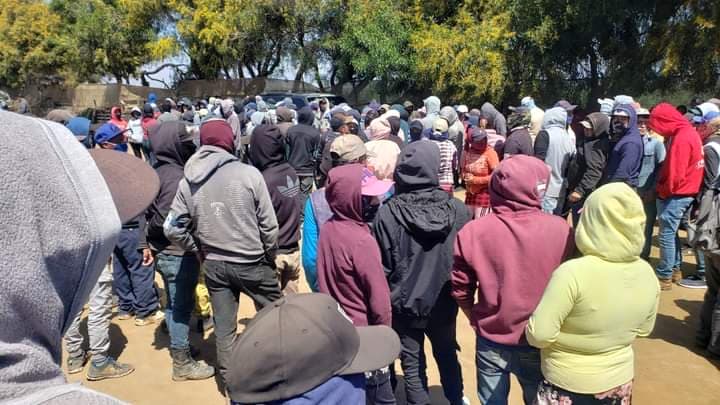
DISCONTENT AND CONFUSION
Agrícola Fragaria is owned by Felipe Ruiz Esparza Arellano, a medium-sized grower who exports strawberries to the U.S. with Fresh Pac International.
Workers went on strike on at least four of his fields to force him to comply with the law. To contain the spreading discontent, he sent all the remaining workers home.
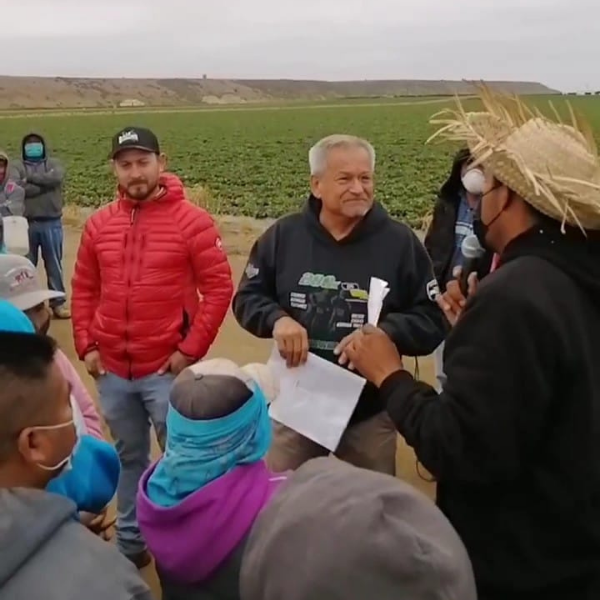
Confronted by workers, Ruiz Esparza Arellano claimed he was not responsible for several of the farms that workers claim he manages. Among the nine farms he operates, some are registered under his name and others under the names of his children. Farmworkers were confused and frustrated at this lack of transparency.
‘OUT WITH THE CTM’
Mexican labor law requires employers to inform their workers of the profits generated each year and the amount of profit-sharing to be dispersed to each worker.
Yet, given the complicity of company-controlled unions that sign sweetheart deals behind workers’ backs, this rarely happens.
One of these employer-protection unions, SINTOIAC (affiliated with the Confederation of Mexican Workers, CTM), represses labor rights like profit-sharing and freedom of association at Rancho Nuevo.
Many workers at Rancho Nuevo Produce are members of the independent union, SINDJA, but they face harassment and retaliation. Strikers chanted, “Out with the CTM.”
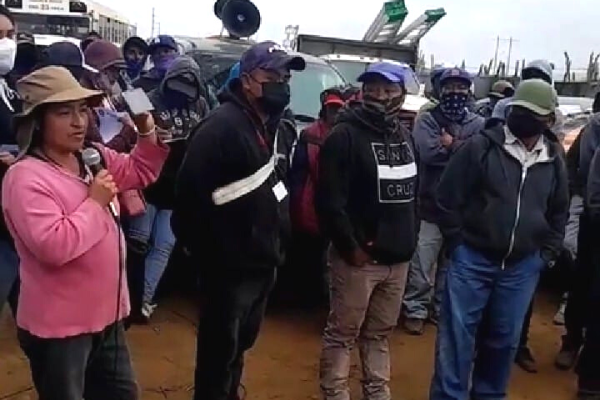
THE STATE INTERVENES
For decades, government officials turned a blind eye to the abuses committed by growers in San Quintín. With the pressure of striking workers and the support of SINDJA, however, this year was different.
On June 2, representatives of the Baja California state labor department (STPS) met with SINDJA, along with workers and administrators from Agrícola Fragaria and Rancho Nuevo Produce. However, state Labor Secretary Alejandro Arregui Ibarra himself did not attend.
Labor department representatives promised to create a special commission to investigate profit-sharing disbursement irregularities, and to hold follow-up meetings in the near future.

SUPPORT LABOR NOTES
BECOME A MONTHLY DONOR
Give $10 a month or more and get our "Fight the Boss, Build the Union" T-shirt.
Despite this progress, the farmworkers expressed two remaining concerns. First, SINDJA saw the labor secretary’s absence as a lack of determination to protect their rights. In a communiqué, the union declared the meeting an “important step forward,” but recognized that it was held because of the strikes, not the government’s goodwill.
The second concern was that the labor department undertook separate meetings with Rancho Nuevo Produce and the company union, SINTOIAC.
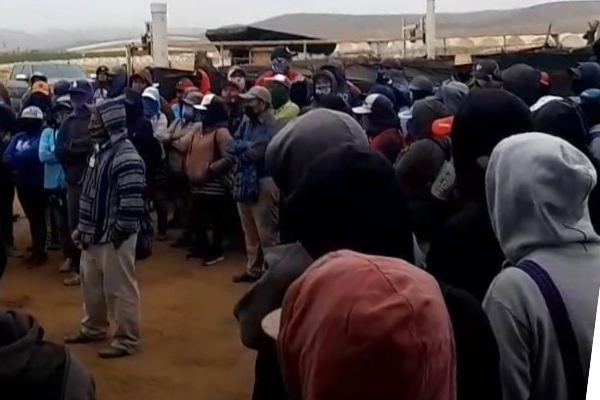
RETALIATION AND IMPUNITY
A small victory was won when Rancho Agrícola Vijose finally relented to worker pressure and disbursed between 600 and 2,000 pesos ($30 to $100 U.S.).
SINDJA pledged to keep up the fight for “better working conditions, better salaries, better benefits, [and] incorporation into the Mexican Institute of Social Security, among other rights.”
And on June 27, the labor secretary finally showed up to meet. Arregui Ibarra met with representatives of SINDJA and a delegation of farmworkers from plantations throughout San Quintín.
He promised greater supervision of growers’ obligations to workers. However, he balked at doing anything about the company-protection unions, arguing that was a federal issue.
SECOND WAVE OF STRIKES
Not content with these promises, farmworkers took matters into their own hands again. New strikes erupted June 30.
Farmworkers at Agrícola Fragaria went on strike once again when the grower Felipe Ruiz had failed to pay workers their profit-sharing dividend by the legal deadline, June 29.
And farmworkers at Agrícola Vijose protested when all the workers were laid off.
Many growers terminate contracts with farmworkers at the end of the growing season—then hire them back shortly thereafter when the new season begins. This allows the grower to keep farmworkers in a permanent temporary status and avoid paying profit-sharing and bonuses.
The recent strikes mark the first time in Mexican history that an independent farmworker union has brought a state government to inspect growers’ systemic labor violations. With each strike, SINDJA’s base of support increases and the union gains membership.
Left to be seen, however, is whether the union can force local growers and international distributers to respect farmworkers’ rights to organize and bargain collectively.
Note: Photographs provided by farmworkers who wish to remain anonymous due to fears of retaliation and blacklisting.
James Daria is an assistant professor of anthropology at Georgia College and State University.




